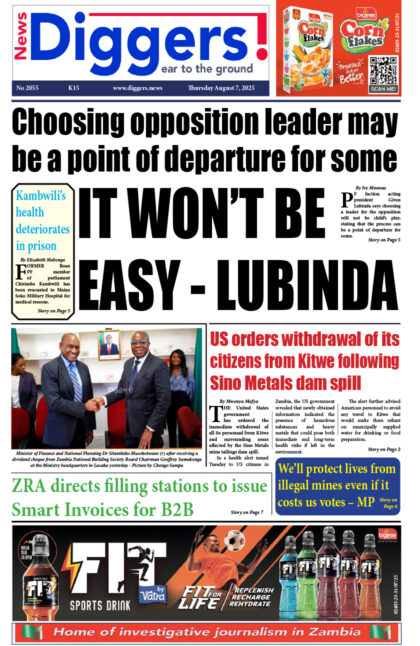MONZE Central UPND member of parliament Jack Mwiimbu has proposed that prisoners should not be allowed to vote separately from members of the public, saying this would protect inmates from being discriminated against based on how they vote.
During debate on the Electoral Process (Amendment) Bill No.30 which came up for second reading in the House, Friday, Mwiimbu noted that given the manner in which prisons are regimented, it would not be in the interest of prisoners to vote separately from the general public.
“Mr Speaker, it is right to state that prison cantonments are regimented and usually what transpires in these facilities is usually under instruction. It is therefore not in the interest of the prisoners themselves and the participating parties that they vote for prisons should be separated from the general public. I have no doubt in my mind Mr Speaker that in the event that the vote does not go in favour of the one who is ruling in the prisons, and then prisoners are allowed to vote separately, there will be discrimination. We should not be seen to be allowing certain categories of individuals to be identified in the way they are going to vote. It shouldn’t be that way Mr Speaker,” he argued.
Mwiimbu also proposed that prisoners should be allowed to vote from outside the prison facilities so that their votes are mixed with those from the members of the general public.
“I would further suggest that if they are given a different place to vote from outside the prison cantonment, the vote must be mixed together with any other member of the public. They should not be seen to say these votes, if they are for me, they are from prisons. So I don’t support this particular proposal, the prisoners must vote together with other members of the public, outside the prison facilities,” he said.
“I would like to bring out how military officials work. We are aware that military officials, they vote outside military cantonments, so that they are not identified that military officials are voting in a particular way. They should vote together with other ordinary citizens. That is the way democracy thrives and that is the way it should be. It is in that light, Mr Speaker, that I suggest that the proposal by the committee [to have prisoners vote without the general public] should not be accepted by this house. Further Mr Speaker, the issue of security for the public and the inmates themselves will be the domain of the officers to ensure that at that polling station where prisoners will be voting from, police and security will be provided.”
And Mwiimbu wondered what mischief was being cured by restricting the announcement of results.
“On the issue of prohibiting the publication of results, Mr Speaker, I am concerned with this particular provision and I agree with the recommendation of the committee that this particular provision be deleted. Currently Mr Speaker there is a law that is in place where the electoral officials at the polling station are authorised to announce the results and after announcing the results, any member of the public will be able to transmit the results to anyone as long as the results have been announced officially. But the way the provision has been couched, it will entail that anyone who will be relating information or results that have been published at a polling station will be committing an offence. What mischief will it be creating Mr Speaker if the results are announced at the polling station as provide for by the current laws, what mischief are we curing? There is no mischief whatsoever. So in my considered view Mr Speaker, there is no need for us to have this particular clause in the electoral process bill. It is retrogressive,” debated Mwiimbu.
He further advised against passing laws that are intended to inhibit the flow of information in the country adding that the content of the clause tally’s with the contents of the Cyber Security Act.
























